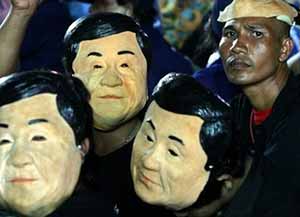January 10, 2008 (the date of publication in Russian)
Ruslan Kostyuk
THAIS LOVE THAIS, AGAIN
Thailand's military junta receives a slap in the face from the disgraced ex-Premier
 In September 2006, Thailand experienced a coup d'etat, ensuing from a combined political and shadowy economic effort from outside and inside (described in details in RPMonitor's analysis dated October 6, 2006, see Russian language text here). Prime Minister Thaksin Shinawatra, who underwent massive international pressure for his cautious attempt to diverge from the US-dictated course, since seemed to have lost all of his political potential in the country. However, the results of the December 2007 snap parliamentary elections proved the opposite.
In September 2006, Thailand experienced a coup d'etat, ensuing from a combined political and shadowy economic effort from outside and inside (described in details in RPMonitor's analysis dated October 6, 2006, see Russian language text here). Prime Minister Thaksin Shinawatra, who underwent massive international pressure for his cautious attempt to diverge from the US-dictated course, since seemed to have lost all of his political potential in the country. However, the results of the December 2007 snap parliamentary elections proved the opposite.
After the coup d'etat, all the levers of power in the "resort kingdom" were seized by a team of generals and their partners in the political elite. The civic regime of Shinawatra, massively criticized for usurpation of power, was efficiently replaced with a military-political hierarchy. Governors were now appointed by the junta, and achieved extraordinary duties. This obvious divergence from democracy was never criticized by Western powers that regularly ostracize the military regime of the neighboring Myanmar.
However, the international backers of the junta overlooked the social implications of the power change. Though being a billionaire and the owner of Manchester City soccer club in Britain, Thaksin Shinawatra, in his capacity of Prime Minister, had pursued a policy addressed to the vast majority of Thailand's population. His social projects included large-scale gasification and modernization of water delivery and sewage systems in remote regions, improvement of local medical services, along with support of local small business. For those reasons, Shinawatra enjoyed popularity mostly in rural regions, while the top banking community, concentrated in Bangkok, was not encouraged with the social bias in his administrative and budget policies.
In their campaign against Shinawatra, the financial and political elite of the capital was focused on corruption charges against his cabinet. However, the new military hierarchy has even more concentrated upon their personal and family interests, while the large-scale projects of infrastructural (especially rural) development were curtailed.
Achieving a carte blanche from the West, the military junta outlawed Shinawatra's political party, Tai Rak Tai (Thais Love the Thais), believing thus to deprive the overthrown the emigrated ex-Premier from any levers of political influence. This belief appeared to be a miscalculation already a year after the coup d'etat. Despite full control over local administrative bodies, despite domination in the sphere of mass media (that played a key role in the anti-Shinawatra political campaign of 2005-06), the military and their political allies failed to win the parliamentary elections.
On December 23, the majority of mandates in the Parliament of Thailand was won by the Party of Popular Power, the successor of Tai Rak Tai, which outstripped the junta-backed Democratic Party with a score of 232 to 165. Though not managing to gain an absolute majority in the 480-seat Parliament, the Party of Popular Power acquired a possibility to establish a coalition government, involving a number of minor allies.
The results of the elections are correctly viewed both in Thailand and abroad as a slap on the face of the military establishment and the pro-Western banking circles. The leaders of the winning party have already raised the question of Shinawatra's return into Thai policy.
The military junta is not going to yield power to the rising political movement that expresses the views of not only Shinawatra's allies but also of the nation's socially deprived majority. However, the royal circles of Thailand have now achieved a better possibility for a multi-vector policy in South-Eastern Asia.
The political elite of Thailand is not going to revise the relations of strategic partnership with the United States and Great Britain which had determined Thailand's policy for decades. At the same time, the major political players, as well as the royal circles, clearly realize the significance of more active economic cooperation with the closest neighbors, including Chin
Number of shows: 1098
 ENG
ENG 

 ENG
ENG 
